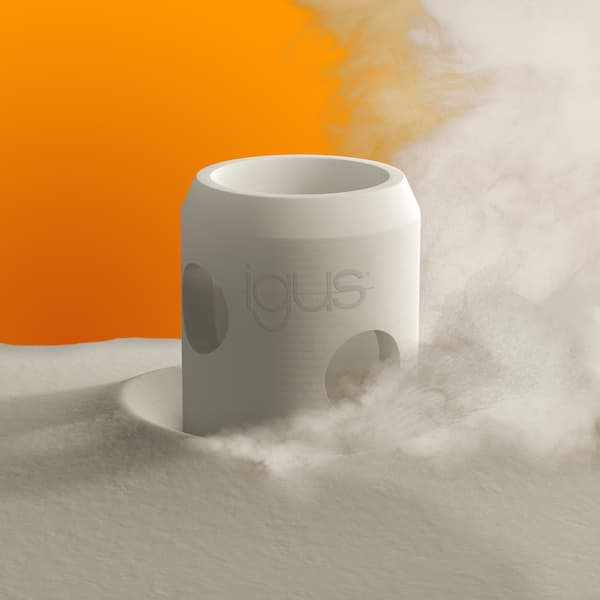Maintenance-free 3D printed grippers transform packaging machine effectiveness
16/03/2021

3D printed plastic grippers save packaging manufacturers 85 per cent on costs and 70 per cent on time.
Animals and birds can adjust the power and position of their grip in many ways to suit their needs. Industrial applications tend to be binary in comparison; mechanical grippers used for attaching lids to jars, for example, have very restricted, “closed/open” dexterity. When a new product is introduced, a new gripper to match that product can take weeks to design and manufacture.
Why not print them? Robust 3D printed plastic grippers made of igus tribo-filaments can be manufactured 85 per cent cheaper and 70 per cent faster than traditional machining aluminium parts.
Alongside the digitalisation of industry, 3D printing or additive manufacturing is considered one of the biggest trends in industrial innovation. The vision of single batches becomes a reality and enables the personalised series production of, for example, furniture, shoes or watches.
The high volume packaging industry also benefits from additive manufacturing. With accurate CAD data of the product, it is easy to manufacture wearing parts such as grippers using an additive process. Since 2015, igus has supplied tribologically-optimised 3D printing filaments for the FDM (Fused Deposition Modelling) process specifically for printing wearing parts. These filaments are made from self-lubricating iglidur high-performance plastics and optimised for wear and friction.
Among many customers to have used tribo-filaments from igus is cosmetics company Carecos Kosmetik. It faced this problem regularly: when a product was changed, its packaging machines needed new grippers to grip the lids and screw them onto cans. Previously, the customer chose to expensively machine a gripper from aluminium, a process that cost many thousands of euros per part with a changeover time of six weeks – too long to wait in the fast-moving packaging industry, where with digitalisation it is increasingly important to produce even small batches economically.
The solution: With the tribologically-optimised iglidur I150 filament, Carecos Kosmetik has found an extremely stable and impact-resistant material for 3D printing, from which a new gripper can be printed within 10 to 12 hours, up to 70 per cent faster than the previous process.
50 times more wear-resistant than standard materials: iglidur 3D printing filaments
Due to the high costs and long production time of the metal parts, the company tried to 3D-print the grippers, initially using standard plastics such as ABS and PLA, but the results were not satisfactory. Carecos Kosmetik then turned to igus and, with iglidur I150, it now has a lubrication-free and maintenance-free tribo-filament optimised for friction and wear.
Because almost every component of the gripper is flexible, and it can glide over surfaces like shafts and pins, the individual parts are exposed to constant wear. Metallic gripper parts must usually be fitted with separate bearings or lubricated in the application. Using 3D printed iglidur I150 enabled the company to save up to 85 per cent of the cost and 70 per cent of the manufacturing time compared to the previous aluminium grippers and eliminate all lubrication requirements.
But that’s not all.
The printed plastic grippers are also seven times lighter than metal grippers. And compared to standard printable materials such as polylactide (PLA), igus’ high-performance plastics are up to 50 times more wear-resistant and can be processed on virtually all standard 3D printers.
Besides its ease of use, iglidur I150’s key feature is that it is compliant with EU Regulation 10/2011 for safe contact with food. With this certification, customers can also use the versatile tribo-filament to print special parts for moving applications in direct contact with foodstuffs, beverages and cosmetics. In addition to iglidur I150, igus offers five further filaments for printing low-friction, wear-resistant parts in a wide variety of applications.
Printing service expands material range
For companies without their own 3D printers, igus’ 3D printing service can print customers’ individual wear-resistant parts directly using the FDM process or selective laser sintering (SLS). Customers can order tribo-filaments as a filament material, or as a finished, ready-to-install printed component from the igus 3D printing service. Here, the product data is transferred online into the browser window in STEP format via drag & drop. Next, the required quantities can be specified and a suitable material selected.
The result: Depending on the request, a formal offer is made or an order is placed immediately. Using SLS printing, igus can produce complex special parts very quickly up to a height of 300 millimetres; mechanical or casting technologies could only produce this using expensive tools. Today, small batches up to 500 units are being produced from the company’s own laser sintering material, iglidur I3, and the SLS material for gears, iglidur I6, within a few days.
The terms “igus”, “Apiro”, “chainflex”, “CFRIP”, “conprotect”, “CTD”, “drylin”, “dry-tech”, “dryspin”, “easy chain”, “e-chain”, “e-chain systems”, “e-ketten”, “e-kettensysteme”, “e-skin”, “e-spool”, “flizz”, “ibow”, “igear”, “iglidur”, “igubal”, “kineKIT”, “manus”, “motion plastics”, “pikchain”, “plastics for longer life”, “readychain”, “readycable”, “ReBeL”, “speedigus”, “triflex”, “robolink”, “xirodur”, and “xiros” are legally protected trademarks of the igus® GmbG/ Cologne in the Federal Republic of Germany and where applicable in some foreign countries.
